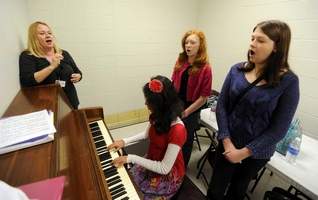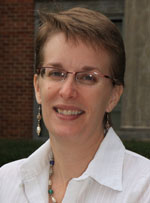(January 31, 2011)
Contact: Rick DelaHaya, Centenary News Services, 318.869.5073
Professor discusses how to nuture children's gifts
By Devin White
email
SHREVEPORT, La. (The Shreveport Times) — When Elizabeth Ross, 12, was just 4 years old she knew more songs than she knew words. After belting out "Take Me Out to the Ball Game" while attending a minor league baseball game, she not only shocked the crowd, but also her mother.

Music instructor Lisa Daye (left), Adrianne Adkins (on piano), Leslie Townsend and Elizabeth Ross work together during the TAP (Talented Arts Program) recently at Caddo Middle Magnet in Shreveport. Ross is in the seventh grade while Adkins and Townsend are eighth-graders. (Jim Hudelson/The Times)
"That's when I realized that she could carry a tune," said Dalton Ross, of Shreveport. "I didn't even know she knew the words to that song. After that she thought every time she went to a ball game she was the show."
As Elizabeth grew older, it became clear to Ross that her child had a gift, and that as a parent it was her job to help nurture that talent.
Ross signed her child up for the theater program through Academy of Children's Theatre and also enrolled her in voice lessons through the Talented Arts Program at Caddo Middle Magnet.
"I've been singing as long as I can pretty much remember." Elizabeth said.
"I like theater, and it just makes me happy to do it."
According to Dr. Amy Hammond, associate professor of psychology at Centenary College, a lot of people think of talent as something people are born with, but in fact these are often learned skills.

Dr. Amy Hammond
"We often have this idea that it's innate, and if your child doesn't have a particular 'gift' in a particular area, then forget it," she said. "The reality is that children can learn how to do all kinds of things."
Hammond said the key to identifying a child's interests is through exposure to a variety of areas.
Michelle Carrigan, of Benton, has her sons, Tyler, 11, and Brandon, 9, involved in sports, after-school activities such as art and robotics, and more recently, she signed them up for guitar lessons.
"The more you learn, the better," she said. "They say the left side of your brain does one thing and your right side does another. I think it's important for them to experience all of it."
Wether or not the child is destined to be the next Drew Brees or Judy Garland, involving them in performance arts or sports can teach valuable life skills, Hammond adds.
"Because of the discipline involved in these areas, it can lead back to discipline on the academic side," she said. "There is also some evidence to suggest that kids who participate in team sports seem to be less inclined to experiment with drugs or alcohol."
Hammond cautions parents against over scheduling children which can adversely affect the development of skills, such as long-term planning, decision making and impulse control.
"Data is suggesting that kids need some time on their own to explore their own boundaries and to just sit with a pile of blocks and decide for themselves how to play with the blocks," she said. "It may not lead to them being an architect, but it does seem to lead to other skills that we value as a society and a culture."
While Elizabeth dreams of one day making it on Broadway, she said she doesn't necessarily have to be a star.
"I'd be happy with being in company," she said. "I just want to be in the theater."
HOW TO NURTURE YOUR CHILD'S GIFTS
- Explore the world together as a family. Visit museums, theaters, zoos and concerts.
- Play games with your child. Mix it up with physical and intellectual games such as soccer or memory games.
- Read with them or make sure they read a variety of books on different subjects.
- Get advice from somebody who works with children, such as coaches, teachers. They can help you determine if your child is actually gifted in a particular domain.
- Pay attention to their interests. Do they like to help out in the kitchen? Do they like to color and draw?
- If your child has interests that are different from what you know, find a mentor for your child. It should be someone who has some training in childhood development because they'll know the proper way to train a child and what are appropriate developmental expectations.
Source: Dr. Amy Hammond, associate professor of psychology at Centenary College
About Centenary College of Louisiana
Centenary College is a private, four-year arts and sciences college affiliated with the United Methodist Church. Founded in 1825, it is the oldest chartered liberal arts college west of the Mississippi River and is accredited by the Southern Association of Colleges and Schools. Centenary is one of 16 colleges and universities constituting the Associated Colleges of the South and has been recognized as "One of the Best 373 Colleges" by the Princeton Review and one of "America's Best Colleges" and one of "America's Best Private Colleges" by Forbes.com. In 2008 Centenary College celebrated 100 years in Shreveport and Bossier City.
